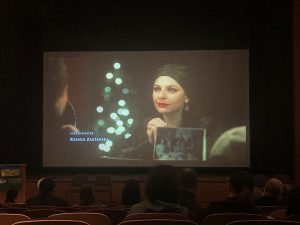News
Ukrainian-Athenians host a film screening to mark the war’s second anniversary
By: Theo Peck-Suzuki | Report for America
Posted on:
ATHENS, Ohio (WOUB/Report for America) — Athens residents and Ukrainian activists came together Tuesday night for a film screening in a solemn commemoration of the second anniversary of the war in Ukraine.
The film, “Carol of the Bells,” follows a family of Ukrainians who suffer under successive Nazi and Soviet occupations. The titular song, familiar to many Americans as a haunting Christmas melody, appears in its original version as the Ukrainian folk song “Shchedryk.”
Organizer Tetyana Dovbnya, who moved to Athens 10 years ago, said both the song and the film reflect a piece of Ukrainian history some have tried to forget.
“It (‘Shchedryk’) is a folk Ukrainian song that was put into music in the early 20th century by the Ukrainian composer Mykola Leontovich,” Dovbnya explained. Leontovich was killed by the Soviet regime in the 1920s.
In the film, the Soviets lambast the Ukrainian family for not speaking Russian. When one little girl sings “Shchedryk” in an attempt to spread cheer at an orphanage, she earns swift condemnation from the matron.

The screening kicked off with a speech from Athens Mayor Steve Patterson, who is traveling to Ukrainian sister city Ostroh Friday.
“Mark my words … Ukrainians are going to prevail in this at the end of the day,” Patterson said. “I believe that in my heart of hearts, but we need to be there to help support that all the way through.”
The event’s organizers asked attendees to call their representatives in support of a bill with military aid to Ukraine currently stalled in the U.S. House of Representatives.
Organizer Svitlana Kalinichenko pushed back on the idea that Ukraine bears responsibility for the war.
“You cannot make peace with people who come to kill you,” Kalinichenko said. “If we just lock our own door in our country (the United States), I don’t think it’s going to go away or it’s not going to affect us.”

